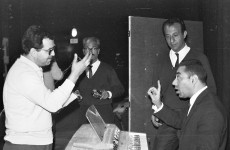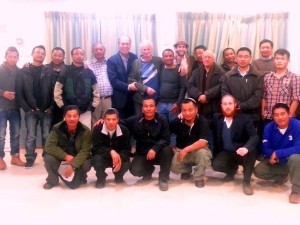
The Bnei Menashe (sons of Manasseh) community are a group of people from India’s North Eastern regions who trace their ancestry to a distant forefather named Manmasi, who is believed to have been Menashe, son of Joseph, son of Jacob, making them descendents of one of the lost ten tribes of Israel.
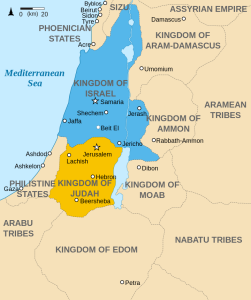
According to the biblical account, there were twelve tribes of ancient Israel that descended from Jacob and dwelled in the Land of Israel. During the time of the First Temple, the kingdom of Israel was a united monarchy of all twelve tribes until it split into two separate kingdoms in 926 BCE – The Southern Kingdom of Judah which included the tribes of Judah and Benjamin (and some Levites), and the Northern Kingdom of Israel which included the remaining ten tribes. In 720 BCE the Northern Kingdom of Israel was invaded by Assyria, the entire remaining population was exiled and the tribes were scattered and lost to history. They have since become known as The Lost Ten Tribes.
The oral history of the Bnei Menashe community is a rich and ancient one that has been passed down for more than 2,000 years and tells of their escape from slavery in Assyria, which brought them to Persia. They continued traveling through the region of Afghanistan toward Hindu-Kush, arriving to the Far East regions of Tibet, Kaifeng, and eventually reaching China, where they believe they were once again enslaved.
They continued traveling through the region of Afghanistan toward Hindu-Kush, arriving to the Far East regions … eventually reaching China, where they believe they were once more enslaved.
During the years of their enslavement in China many Israelites were killed, marking the beginning of their assimilation in the region. Some fled and lived in caves. Around 100 CE the community was expelled from the region, and their “leather scrolls” were seized and burned. At this point the Israelite community began to scatter to various regions in the East, some traveling to and eventually settling in Burma and India. To this day, the descendents of the community that migrated to Burma and India are referred to by some as “Shinlung,” which means ‘cave dwellers’.
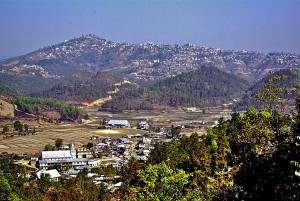
Today, the descendents of the Israelites that settled in India and Burma have different names such as Shinlung, Mizo, Mar, Kuki, and Lushai. While the community knew their own ancient oral tradition, it wasn’t until 1894, when Christian missionaries arrived to the Manipur area of North East India, that the Kukis, with the newly added benefit of bibles, made the connection between their ancestor “Manmasi” and the biblical narrative of the Israelites and tribe of Manasseh, and other familiar stories. For instance, they were able to recognize the story of the exodus from Egypt in a traditional song of their own that had been passed down through the centuries, surviving the many wanderings of the community:
“We must keep the Passover festival
Because we crossed the Red Sea on the dry land
At night we crossed with a fire
And by day with a cloud
Enemies pursued us with chariots
And the sea swallowed them up
And used them as food for the fish
And when we were thirsty
We received water from the rock”
At the time, many Bnei Menashe descendents converted to Christianity. However, over time some Kukis began to realize that their biblical connection made them descendents of the Jewish heritage rather than the Christian one, and they began practicing Judaism in small but growing numbers. Connections were made to the nation of Israel and Jewish Rabbis, and today there are over 5,000 Bnei Menashe practicing Judaism in North East India and Myanmar.
… over time some Kukis began to realize that their biblical connection made them descendents of the Jewish heritage, rather than the Christian one…
In the 1980’s, organizations dedicated to finding the Lost Tribes and returning them home, such as Amishav and Shavei Israel, began to facilitate Aliyah (emigrate) to Israel, and in 2005 Israel’s Chief Rabbi accepted the Bnei Menashe as Jews for their devotion, but still required that they undergo formal conversions to Judaism. Being able to finally return home after so many centuries is a dream come true to those who have come, and many more hope and pray for the same opportunity.
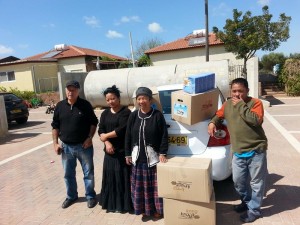
Despite the joy in coming, the transition has not been a simple one for those who have left their language and culture to start a new life in Israel. According to the Israel Gives – Education & Welfare project, about 2,000 Bnei Menashe members now live in Israel. All enter Israel as non-Jews, and as such, are not entitled to government assistance. They must first go through an orthodox conversion, which can last more than a year, in order to qualify for Israeli citizenship. A vast majority takes up minimum wage jobs and works long and odd hours just to make ends meet. There is very little time or money left for children or their extracurricular activities, and lesser still, to study for educational or professional advancement. The community faces serious social challenges adjusting to the Israeli society.
One organization that offers a helping hand to the Bnei Menashe community is Jewish Projects, a group that supports important social projects and seeks to create awareness for them and give them a voice. They work hand in hand with the Israel Gives initiative to provide food baskets for the Bnei Menashe senior and citizens and families.




